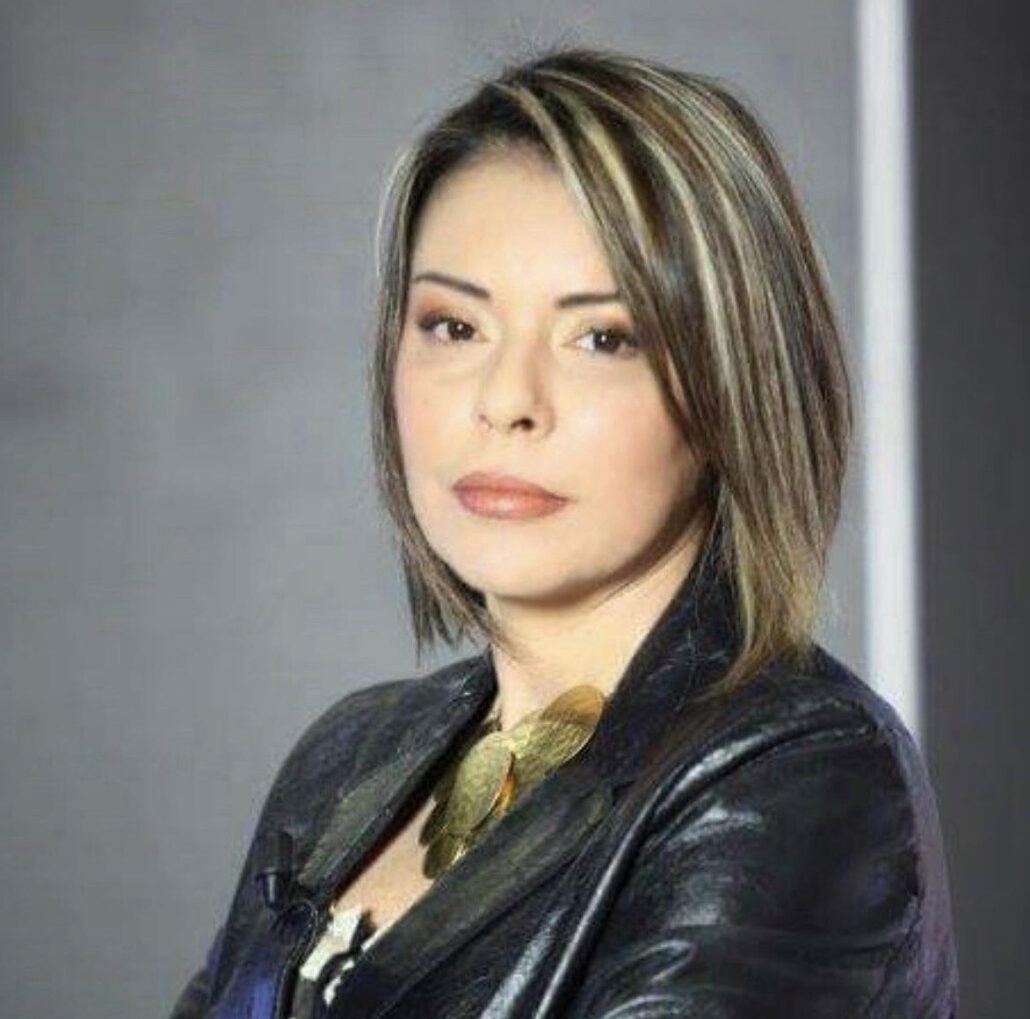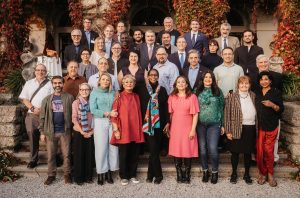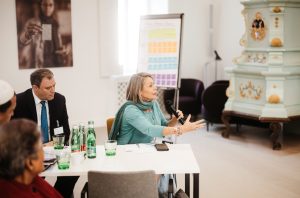Dalia Al-Aqidi’s Mission to Expose Radical Islamism—From the Middle East to the U.S.

August 27, 2025
In 2022, guided by the vision of our founder, Ayaan Hirsi Ali, AHA launched the CLARITy Coalition to counter radical Islamism. Since its founding, the Coalition has grown into a global network with 56 members across numerous countries. Many of its members have experienced the consequences of Islamist extremism firsthand, shaping their work with deep conviction.
Among them is Dalia Al-Aqidi, a prominent journalist whose career has been defined by an unwavering commitment to telling the stories of those silenced by oppressive regimes. For the past 3 years, she has been an integral member of the CLARITy Coalition, strengthening her fight against Islamist extremism by working alongside a global community of reformers.
AHA Foundation: Dalia, How did your journey from Iraq to the United States shape your understanding of freedom and democracy, and how has it influenced your work as a journalist?”
Dalia Al-Aqidi: I was born in Baghdad to parents who helped build Iraq’s cultural soul through theater. From them, I inherited not just a love of storytelling but a deep belief in coexistence, compassion, and human dignity. Our home was a sanctuary, a rare secular space that shielded me from the rising tide of hate and tyranny outside.
As a child, I was sent to a Christian boarding school in Lebanon, and there, I witnessed my first war. A war not just of weapons but of ideology, driven by hatred and the refusal to accept difference. From Lebanon, my journey took me to the UAE and then back to Baghdad in 1979, the year Saddam Hussein claimed absolute power. Not long after, I experienced my second war, the brutal and senseless Iran-Iraq conflict, as a young girl.

Dalia Al-Aquidi (third from left, front row) with other CLARITy Coalition members at the first CLARITy conference in Salzberg, Austria.
I watched with my own eyes how a dictatorship cements itself through fear, repression, and the systematic destruction of independent thought. Outside our walls, hatred was institutionalized. Israel was wiped from maps, and its destruction wasn’t just wished for; it was taught as a moral duty. Indoctrination began in childhood: we were made to chant slogans glorifying freedom, even as that very freedom was crushed under the weight of totalitarian rule.
You could not speak freely. You could not question. You could not dream beyond the limits imposed by the regime. And yet, I refused to accept that as the norm.
That mission eventually led me to the United States in 1993, where I continued my journalism career. I’ve reported from war zones, interviewed terrorists, and stood with the forgotten and the persecuted. I’ve told the stories the world too often ignores, from Christians threatened with annihilation to Yazidi girls who were trafficked and enslaved.
At every step, my purpose has remained the same: to unmask radical Islamist ideology for what it truly is, not a religious awakening but a political plague. A movement that twists faith into a weapon that crushes dissent and leaves devastation in its wake.
I believe in freedom, not just as a word but as a moral obligation. I know what it means to live without it. And that’s why I will never stop speaking out, no matter how uncomfortable the truth may be. Because silence, in the face of evil, is complicity.
“At every step, my purpose has remained the same: to unmask radical Islamist ideology for what it truly is, not a religious awakening but a political plague. A movement that twists faith into a weapon that crushes dissent and leaves devastation in its wake.”
AHA Foundation: What are some of the biggest challenges you face in promoting reform within Muslim communities, and how do you address these challenges?
Dalia Al-Aqidi: One of the most brutal truths I’ve come to learn is this: people will stand with you until your message challenges their comfort, their identity, or their deeply held beliefs. I’ve experienced it time and again. The moment you speak against extremism from within, the labels come pouring in. I’ve been called a kafir, an Islamophobe, a Zionist, anti-Arab, anti-Muslim, anti-immigrant—even a white supremacist, which is ironic considering I am a Muslim Arab American.
But this is the cost of speaking the truth in a time of moral confusion. I was not raised to be silent in the face of injustice. I was raised to fight, not with violence, but with courage, reason, and conviction. I’ve always believed that silence only serves the oppressor. So yes, it gets lonely. It gets exhausting. There are moments when the weight of it all can feel overwhelming. However, I’ve made peace with the discomfort because I know the mission is worthwhile.
“I was not raised to be silent in the face of injustice. I was raised to fight, not with violence, but with courage, reason, and conviction.”
AHA Foundation: What motivates you to keep fighting, even in the face of these challenges?
Dalia Al-Aqidi: Years ago, a dear friend gave me a coffee mug that simply reads: “Making a difference is what I do.” It might seem small, but that phrase has stayed with me through some of the darkest times. It became more than a slogan—it became my anchor. On the days when the threats pile up, when the criticism is vicious, or when I feel like I’m standing alone, I remember that mug. I remember why I started this journey. I remember the voiceless who are still afraid to speak.
What keeps me going is the silent majority, the moderates, the reformers, the freedom-seekers, who may not always have the platform or the courage to speak out but who see the truth and need someone to say it for them. I fight for them. I fight for the future I believe our communities deserve: one built on dignity, equality, and the freedom to believe—or not believe—without fear.
True reform is never easy. It’s uncomfortable. It shatters illusions and challenges established power structures. However, if we’re serious about confronting extremism, we must be willing to endure the backlash that comes with telling the truth. And I am. Because I don’t just want to exist in this world; I want to help change it.
“What keeps me going is the silent majority, the moderates, the reformers, the freedom-seekers, who may not always have the platform or the courage to speak out but who see the truth and need someone to say it for them.”
AHA Foundation: As a journalist and a free speech advocate, how do you view the current state of free speech in the West, especially concerning criticism of Islamism and its ideology?
Dalia Al-Aqidi: The greatest gift the Western world has given us is freedom, the freedom to speak, question, dissent, and pursue truth without fear. It’s no coincidence that freedom of speech is enshrined as the First Amendment to the United States Constitution. It’s the foundation of all other liberties. Without it, democracy withers, and tyranny finds fertile ground.
But in recent years, I’ve watched with deep concern as this foundational right comes under increasing threat, not from authoritarian regimes abroad, but from within, under the guise of sensitivity, tolerance, and political correctness. Nowhere is this more evident than in the discussion, or more accurately, the avoidance of Islamism and its political ideology.
Islamists have been disturbingly successful in redefining the conversation. They’ve weaponized the term “Islamophobia” to blur the lines between legitimate critique of a dangerous political ideology and hatred toward individual Muslims. And in doing so, they’ve created a chilling effect on public discourse. Today, people like me, Muslims who dare to criticize extremism within our own faith, are smeared, silenced, and branded with slurs meant to discredit rather than engage.
I’ve been labeled an Islamophobe for exposing Islamist narratives. I’ve been called a bigot for defending human rights and a sellout for standing with victims of terrorism, many of whom are Muslim themselves. But I refuse to be silenced. Because I know what censorship looks like. I’ve lived it. I’ve reported from countries where the truth costs lives. I’ve seen the consequences of suppressing speech and will never stop fighting to preserve it.
Free speech is not about comfort. It’s about courage. It’s the courage to confront uncomfortable truths, to debate dangerous ideas, and to hold ideologies, all ideologies, accountable. Islamism is not above criticism. It is a political movement, not a sacred tenet. And when it threatens freedom, silences women, persecutes minorities, or justifies violence, it must be challenged openly, fearlessly, and unapologetically.
The West must not surrender its greatest strength in the name of appeasement. If we allow fear of offense to dictate our discourse, we will gradually cede our hard-won freedoms to those who seek to dismantle them from within.
“But I refuse to be silenced. Because I know what censorship looks like. I’ve lived it. I’ve reported from countries where the truth costs lives. I’ve seen the consequences of suppressing speech and will never stop fighting to preserve it.”
AHA Foundation: In light of your involvement with the CLARITy Coalition, could you discuss the coalition’s impact on shifting the narrative away from radical Islamist groups within public discourse?
Dalia Al-Aqidi: The CLARITy Coalition was founded on a simple but vital premise: that the well-funded, well-organized machinery of radical Islamist groups must no longer drown out the voices of moderate, reform-minded individuals. For too long, groups with extremist agendas have falsely claimed to speak on behalf of all Muslims — manipulating identity, distorting faith, and intimidating dissent.
The impact we’ve had is significant. We’ve begun to reframe the conversation by drawing clear distinctions between Islam as a faith and Islamism as a political ideology. That’s an essential shift because, for years, criticism of political Islam was deliberately conflated with attacks on Muslims themselves, allowing extremists to hide behind accusations of Islamophobia. We are exposing that tactic for what it is: a calculated strategy to silence reform and shield radicalism from scrutiny.
Through our work, whether in public advocacy, policy engagement, or media outreach, we are elevating the voices of those who reject extremism, believe in pluralism, and are committed to building bridges rather than walls. We’re also calling out the complicity of governments and institutions that continue to platform Islamist groups in the name of “community engagement” while ignoring the harm they cause to the very communities they claim to represent.
I’m proud to stand with the CLARITy Coalition because we don’t just talk about the problem; we confront it head-on.
“Islamism is not above criticism. It is a political movement, not a sacred tenet. And when it threatens freedom, silences women, persecutes minorities, or justifies violence, it must be challenged openly, fearlessly, and unapologetically.”
AHA Foundation: What personal experiences or motivations drive your commitment to your cause?
Dalia Al-Aqidi: My commitment comes from living under tyranny and witnessing the devastating impact of extremism firsthand. I grew up in Iraq during war and dictatorship, where freedom was a distant dream and questioning authority could cost you everything.
I’ve interviewed terrorists, stood with victims of radical ideologies, and seen lives torn apart by hatred disguised as faith. Those experiences shaped me and gave me a mission. I fought back with my voice, exposed the truth, and defended freedom, reform, and human dignity.
“I’m proud to stand with the CLARITy Coalition because we don’t just talk about the problem; we confront it head-on.”
AHA Foundation: What can individuals inspired by your story do in their communities to promote dialogue and understanding across different cultural and religious groups?
Dalia Al-Aqidi: It starts with courage, the courage to speak up, listen with an open mind, and engage with people who think, look, or believe differently than you. Real dialogue doesn’t happen in echo chambers. It happens when we step outside our comfort zones and choose connection over division.
I always tell people you don’t need a platform to make an impact. Start in your own neighborhood, your school, your workplace. Create spaces where people can share their stories without fear. Challenge hate when you hear it, even if it’s uncomfortable. Stand up for the values of freedom, equality, and mutual respect.
Most importantly, don’t be afraid to ask hard questions, and don’t silence others for doing the same. Promoting understanding doesn’t mean avoiding difficult conversations; it means having them with honesty, empathy, and conviction.
We change the world by changing the culture around us, one conversation, one act of courage at a time.
“Around the world, more and more Muslims are rising to reject the stranglehold of extremism and reclaim their faith from those who have weaponized it for political gain.”
AHA Foundation: As you look to the future, what are your hopes for the global movement against religious extremism and Muslim reform?

Dalia Al-Aqidi engaging in a thoughtful conversation during a break out session at the 2022 CLARITy Coalition Conference
Dalia-Al Aqidi: My hope is rooted in the conviction that we are at a turning point. Around the world, more and more Muslims are rising to reject the stranglehold of extremism and reclaim their faith from those who have weaponized it for political gain. I believe the future belongs to those who champion reform, uphold human dignity, and speak the truth, even when it is difficult.
As the Director of the International Muslim Counter Voice at Secure Canada, I’m proud to be leading an initiative that gives moderate Muslims exactly what they’ve been denied for too long: a shelter and a voice. We are building a platform where reform-minded leaders, thinkers, and citizens can come together to engage in honest conversations, challenge radical narratives, and offer a hopeful, principled alternative.
This isn’t just about pushing back against extremism but building something better. A space where Muslims can thrive without fear or intimidation. Where diversity of thought is celebrated. Where young people can look to leaders who reflect their values, not the ideologies of hate and division.
The movement against religious extremism is no longer on the margins; it’s growing, global, and unstoppable. I am honored to be part of a generation that refuses to be silent and believes reform is not only possible but also necessary. Together, we are rewriting the future; this time, it will be one of freedom, courage, and truth.

